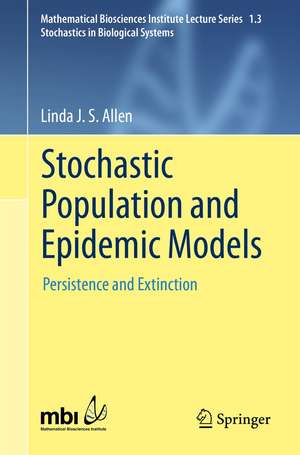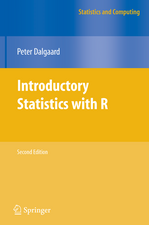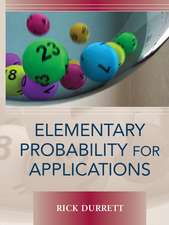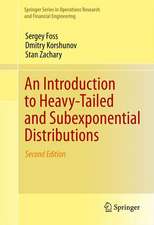Stochastic Population and Epidemic Models: Persistence and Extinction: Mathematical Biosciences Institute Lecture Series, cartea 1.3
Autor Linda J. S. Allenen Limba Engleză Paperback – 2 sep 2015
These notes originated as part of a lecture series on Stochastics in Biological Systems at the Mathematical Biosciences Institute in Ohio, USA.
Professor Linda Allen is a Paul Whitfield Horn Professor of Mathematics in theDepartment of Mathematics and Statistics at Texas Tech University, USA.
Preț: 347.24 lei
Nou
Puncte Express: 521
Preț estimativ în valută:
66.45€ • 71.05$ • 55.40£
66.45€ • 71.05$ • 55.40£
Carte tipărită la comandă
Livrare economică 14-21 aprilie
Preluare comenzi: 021 569.72.76
Specificații
ISBN-13: 9783319215532
ISBN-10: 3319215531
Pagini: 47
Ilustrații: X, 47 p. 12 illus. in color.
Dimensiuni: 155 x 235 x 10 mm
Greutate: 1.18 kg
Ediția:1st ed. 2015
Editura: Springer International Publishing
Colecția Springer
Seriile Mathematical Biosciences Institute Lecture Series, Stochastics in Biological Systems
Locul publicării:Cham, Switzerland
ISBN-10: 3319215531
Pagini: 47
Ilustrații: X, 47 p. 12 illus. in color.
Dimensiuni: 155 x 235 x 10 mm
Greutate: 1.18 kg
Ediția:1st ed. 2015
Editura: Springer International Publishing
Colecția Springer
Seriile Mathematical Biosciences Institute Lecture Series, Stochastics in Biological Systems
Locul publicării:Cham, Switzerland
Public țintă
GraduateCuprins
Continuous-Time and Discrete-State Branching Processes.- Applications of Single-Type Branching Processes.- Applications of Multi-Type Branching Processes.- Continuous-Time and Continuous-State Branching Processes.-MatLaB Programs.
Recenzii
“The readers will certainly appreciate the quality of a text written in a very clear way, well-organized and with high pedagogical standard. … Stochastic Population and Epidemic Models (Persistence and Extinction) is indeed a short, but complete, manual for the study of stochastic population and epidemic models indispensable for graduate students, for whom it was thought, but also accessible to many more audiences: professionals or simply curious on these subjects.” (Manuel Alberto M. Ferreira, Acta Scientiae et Intellectus, Vol. 3 (2), 2017)
Notă biografică
Linda J. S. Allen is a Professor in the Department of Mathematics and Statistics at Texas Tech University. Allen's primary research interest is mathematical modeling in biology. She formulates and analyzes deterministic and stochastic models in describing population, epidemic, viral and immune-system dynamics.
Textul de pe ultima copertă
This monograph provides a summary of the basic theory of branching processes for single-type and multi-type processes. Classic examples of population and epidemic models illustrate the probability of population or epidemic extinction obtained from the theory of branching processes. The first chapter develops the branching process theory, while in the second chapter two applications to population and epidemic processes of single-type branching process theory are explored. The last two chapters present multi-type branching process applications to epidemic models, and then continuous-time and continuous-state branching processes with applications. In addition, several MATLAB programs for simulating stochastic sample paths are provided in an Appendix.
These notes originated as part of a lecture series on Stochastics in Biological Systems at the Mathematical Biosciences Institute in Ohio, USA.
Professor Linda Allen is a Paul Whitfield Horn Professorof Mathematics in the Department of Mathematics and Statistics at Texas Tech University, USA.
These notes originated as part of a lecture series on Stochastics in Biological Systems at the Mathematical Biosciences Institute in Ohio, USA.
Professor Linda Allen is a Paul Whitfield Horn Professorof Mathematics in the Department of Mathematics and Statistics at Texas Tech University, USA.
Caracteristici
Summarizes basic theory of branching processes for single-type and multi-type processes Includes classic examples of population and epidemic models MATLAB codes to simulate stochastic sample paths provided Includes supplementary material: sn.pub/extras




















